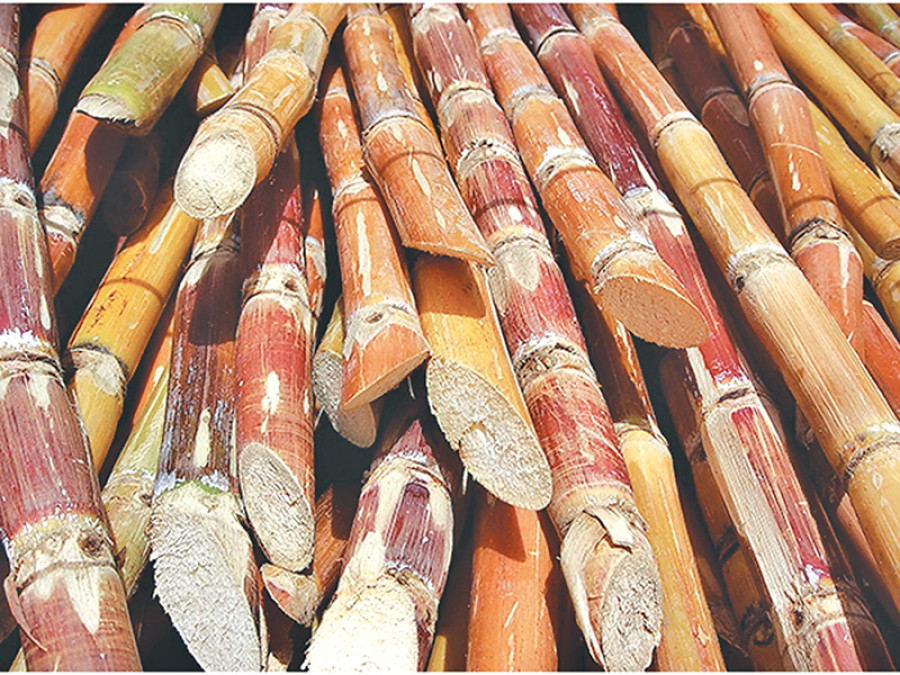Money
Sugarane farmers call off protests
Sugarcane farmers in Sarlahi district called off their two-week long protests on Tuesday after farmers and mill operators reached a 6-point agreement to settle outstanding payment to farmers.
Aman Koirala
Sugarcane farmers in Sarlahi district called off their two-week long protests on Tuesday after farmers and mill operators reached a 6-point agreement to settle outstanding payment to farmers.
In a meeting among mill operators, farmers and the provincial government held at Janakpur, mill operators agreed to start paying farmers for sugarcane purchased in the past, starting from April 5 and settle all outstanding amounts by mid-August with payments every 15 days.
Shesh Mahabubh Reja, Ward Chairman of Hariban Municipality-11, called off his fast unto death strike on Tuesday morning—already in fourth day—after mill operators agreed to release outstanding payments to sugarcane farmers.
Likewise, Sugarcane Producer’s Committee, Sugarcane Farmers Federation and other organisations working on behalf of sugarcane farmers also announced that the protest ongoing since last two weeks will be called off as demands of farmers have been met.
Chief Minister of Province 2 Lal Babu Rawat had expressed solidarity with farmers when he visited the site on Sunday. He had also assured them that the provincial government would come up with immediate steps to resolve the problem, saying that mill operators have been exploiting sugarcane farmers. The dialogue held at Janakpur was made at his behest.
Upendra Mahato, a parliamentary member of the province-2, represented the provincial government during the dialogue on Monday night. As he took a stance on behalf of the government that the demands of farmers be met at any cost, entrepreneurs were forced to come up with an agreement.
Mahato said, “As both farmers and mill operators were present during the dialogue, it was helpful to reach an agreement,” adding, “The provincial government was worried over farmer’s issues and wanted to quickly resolve the issue.”
Mill operators also agreed to purchase all sugarcane produced by farmers of the district and to avoid import of foreign sugarcane without seeking permission from the provincial government.
“Mill operators also agreed that the pollution caused by sugar mills be controlled by coordinating measures with local bodies,” said cane farmer Chunda Mani Wagle.
According to the agreement, a dialogue will be hosted under the discretion of provincial government to settle the issue of fixing sugarcane prices next year during the crossing season.
After Reja’s fast unto death strike, mill operators were under pressure as the provincial government also showed interest in resolving farmers’ grievances.
The protest also grew over days as various sugarcane farmers started supporting the protestors.
Thousands of farmers visited the strike site. Deterioration of Raja’s health also put a pressure on entrepreneurs to resolve the issue.
Farmers of Hariban felicitated Reja with flowers and vermillion after the dialogue was successful. He was praised for undertaking the death fast on behalf of farmers, which was also the first time such strike was conducted for demands of sugarcane farmers.
Reja said,“A protest is not necessarily just hurling stones and halting vehicles. It is possible to protest strongly without harming anyone.”
Although sugarcane farming in Province 2, including Sarlahi district, face problems such as lack of labour, aging farmers, payment disputes, unfavourable climate and a delay of mechanisation, sugarcane farming and its output in Province 2 is surging.
Sugarcane is cultivated on 23,000 hectares in the district and farmers are expanding their farms to include better irrigation facilities.
Government statistics show that imports of sugar and sugarcane production have been increasing at a fast rate, especially in recent years, due to increased consumption. Although sugarcane can also be used as biofuel and electricity production, such potential remains untapped.
Statistics of Department of Customs reveal that Nepal imported sugar worth Rs6.72 billion in the last fiscal year 2016-17, a jump of 38 percent. As production within the country meets only about 50 percent of domestic demand, the deficiency is made up with imports from India.




 14.24°C Kathmandu
14.24°C Kathmandu















